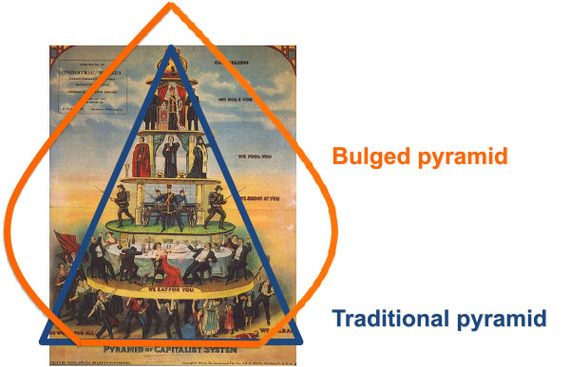The Boomers wanted self-expression, Gen X wanted experiences, however the Millennia generation wants to make a difference and they don't buy any of the current corporate BS. So, how will this ultimately affect the many institutions of today that mimic pyramid schemes?
Many in our society are continually whining about the top one-percentile and how wealth is "so unevenly distributed." However, throughout the history of mankind, the distribution of wealth has never been fair and being a member of the top one-percentile is not all it is cracked up to be. Low interest rates in the foreseeable future mean their fortunes lose value every second of the day.
At night, they toss and turn not because of potential threats from their competitors, but from worrying about those two proactive, bright entrepreneurs in a garage somewhere, concocting their new breakthrough offerings.
Those nerds are making products, services or experiences that will actually make a difference and put the incumbents out of business. These nascent startups have strong 'Whys,' develop new 'How's,' and end up providing a breakthrough 'What.' Think Uber, Airbnb and Facebook. Because of this, they create immense value, often where no value existed before, and, in effect, they bulge the pyramid.
Unfortunately this game also has countless untold casualties. Only one in a thousand startups reach their Initial Public Offering (IPO) and a dismal one out of ten thousand companies make it to Unicorn status where a valuation of one billion or more is required.
These nine hundred ninety-nine casualties per one thousand are invisible and the business press doesn't waste any ink on them. These unfortunate entrepreneurs pay for their venture with second mortgages, their children's college funds, their health, their marriages and maybe even their sanity.
If entrepreneurship is one way to avoid pyramid structures, how might we build better startup ecosystems that provide more winners and lessen the suffering of the losers? Three avenues that would provide immediate benefits are better support systems together with targeted education of entrepreneurs and empirical research to advance the field.
Business, design and engineering schools increasingly offer their students entrepreneurial courses and encourage them to compete in events such as contests for writing business plans, startup weekends and hackathons. These courses and events provide promising entrepreneurs with essential knowledge, helping them to assess how they are performing and whether it is time to quickly pivot or retire the venture altogether.
Entrepreneurial organizations, such as Innovate Pasadena, and co-working spaces such as Cross Campus, also collaborate to provide support to entrepreneurs. Their contributions come in the form of educational presentations, pitching practice, connecting with local investors and networking with fellow entrepreneurs, consultants and local business people. Through this network, entrepreneurs can then identify unique opportunities and develop the personal contacts to pursue them.
Finally, as in all other fields, new entrepreneurial ventures require their own product development methods. By developing new management methods, processes and tools, academic institutions such as Stanford University and Niels Brock's CIBU support incremental and breakthrough new entrepreneurial ventures. While collaborating with entrepreneurs, they collect empirical data, ensure that the new methods are useful and facilitate dissemination within the startup ecosystems.
Farmers actually embodied the original entrepreneurial spirit, so entrepreneurship has always been with us; however only within the last decade has it received academic attention. That being said, perhaps entrepreneurship will now begin the disruption our somewhat outmoded educational system.

